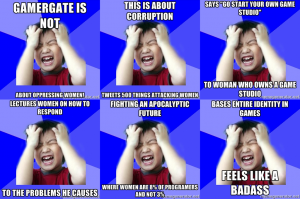Brianna Wu, Washington Post, October 20, 2014– They’ve taken down women I care about one by one. Now, the vicious mob of the Gamergate movement is coming after me. They’ve threatened to rape me. They’ve threatened to make me choke to death on my husband’s severed genitals. They’ve threatened to murder any children I might have.
This angry horde has been allowed to wage its misogynistic war without penalty for too long. It’s time for the video game industry to stop them.
Gamergate is ostensibly about journalistic ethics. Supporters say they want to address conflicts of interest between the people that make games and the people that support them. In reality, Gamergate is a group of gamers that are willing to destroy the women who have invaded their clubhouse.
The movement is not new. Two years ago, when Anita Sarkeesian tried to crowdfund a series of videos critiquing the hypersexualized female characters of video games, they threatened to kill and rape her. The movement reached fever pitch – and got its name — when a jilted former lover of indie game developer Zoe Quinn published transcripts of her life online. Gamers who were outraged over charges that Quinn’s game Depression Quest had received favorable reviews due to an alleged romantic relationship with a journalist, seized the opportunity to shame and terrify her into hiding. Now, Gamergate is a wildfire that threatens to consume the entire games industry.
The fact that Gamergate supporters went after Quinn and not the journalist says everything you need to know about the movement.
I became Gamergate’s latest target when I tweeted this joke about supporters of the movement:
The next day, my Twitter mentions were full of death threats so severe I had to flee my home. They have targeted the financial assets of my company by hacking. They have tried to impersonate me on Twitter. Even as we speak, they are spreading lies to journalists via burner e-mail accounts in an attempt to destroy me professionally.
We’ve lost too many women to this lunatic mob. Good women the industry was lucky to have, such as Jenn Frank, Mattie Bryce and my friend Samantha Allen, one of the most insightful critics in games media. They decided the personal cost was too high, and I don’t know who could blame them.
Every woman I know in the industry is terrified she will be next.
The culture in which women are treated this way by gamers didn’t happen in a vacuum. For 30 years, video games have been designed by men, marketed to men and sold to men. It’s obvious to anyone outside the industry that video games have serious issues with the portrayal of women. It’s not just oversexualized examples, such as Ivy of the Soul Caliber series. Games are still lazily falling on the same outdated tropes involving women. Princess Peach, of Nintendo’s Mario games, has been kidnapped in 12 separate games since 1985. Perhaps the most disturbing of all is the propensity of games to have women thoughtlessly murdered as a motivation for the male hero, such as Watch Dogs.
Read More: Washington Post


 Follow
Follow